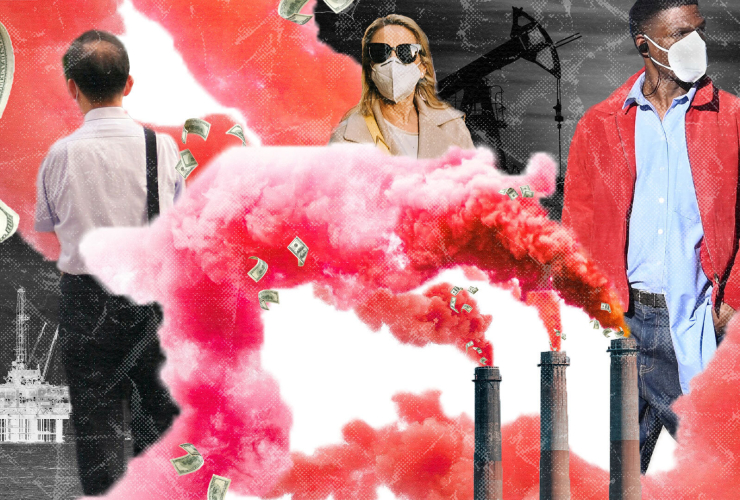Change Course, Stand.earth and Canada’s National Observer launched the first annual Climate Finance Scholarship Contest, an opportunity for young people across Canada to showcase and share visionary, solutions-oriented essays that reimagined the role of Canada's Big Six banks and other powerful financial institutions in our communities. Each of the two contest winners won $2,500 scholarships for written or multimedia submissions. Mimi O’Handley's essay, which challenges financial institutions to reinvest in solutions to help combat the climate crisis, is one of the two winners. Diana Yoon is the second winner. We'll feature her essay tomorrow.
It’s almost a decade since the adoption of the historic Paris Agreement, the legally binding international treaty committed to limiting global warming to 1.5°C above pre-industrial levels. Recent reports, however, show staying below 1.5°C is increasingly unlikely. Now, more than ever before, we need to cut emissions by abandoning fossil fuels, and fast. Financial institutions have the power and influence to play a major part in this transition. It is not only important that financial institutions divest immediately from fossil fuels, but also how financial institutions do so.
An increasingly popular interest among large institutions, including the financial industry, is the critical minerals required for energy products such as EVs, wind turbines and other renewable-energy technologies and systems. For example, in their post entitled “Mobilizing Critical Minerals Investment for the Energy Transition,” BMO highlights that, “the most important building blocks forming a path to net zero are critical minerals.”
The environmental and social impacts of the mining of critical minerals can be devastating. Destruction of natural environments and ecosystems, pollution of local water systems and air, loss of biodiversity, displacement of communities, escalation of social and economic inequalities, health hazards and mental health impacts are all repercussions of the mining industry. This industry also often undermines the sovereignty of Indigenous communities to make decisions regarding lands and resource management on their territories, as per the United Nations Declaration on the Rights of Indigenous Peoples.
There are also insufficient critical minerals available to meet demand for extraction. A report for Earthworks by the Institute for Sustainable Futures notes the projected demand for minerals would exceed all of the cobalt, lithium and nickel resources on the planet.
Besides these impacts, a ‘clean’ energy transition is not necessarily clean. In some cases, biodiversity is lost due to the fragmentation of lands and water. Natural ecosystems can be destroyed, particularly during the construction phase of projects. In other cases, greenwashing can be used to label renewable energy actions that are actually false solutions.
We need to be careful that disinvestments in fossil fuels are not replaced by systems that effectively replicate and perpetuate many of the same harms: ongoing colonization, oppression of marginalized people and communities, destruction of natural ecosystems and loss of biodiversity, and gaslighting the public through greenwashing tactics. This would not constitute a just transition.
How financial institutions reinvest in renewable energy and climate safe solutions matters. In order to achieve a ‘just’ transition, a radical, holistic and equitable approach must be taken. Financial institutions have the opportunity to harness their influence in different ways and become important players in this journey.
Firstly, financial institutions should develop rigorous criteria for all renewable energy projects they choose to finance. This needs to begin by accepting and respecting Indigenous rights to self-determination, and ensuring free, prior, and informed consent. Financial institutions should refuse to back any investment that does not respect this.
Other environmentally important investments could include projects that responsibly source low-carbon, reused and/or recycled materials; projects that significantly promote biodiversity; projects that prioritize longevity of materials and equipment; projects committed to reusing or recycling materials and equipment upon project decommission.
If major financial institutions like banks, investors, and pension funds generate high and strict standards that centre people and the environment, this could positively shape everything in the renewable energy industry from the sourcing of materials through to the eventual decommission.
Secondly, financial institutions can utilize their influence to enact systemic changes that uplift climate justice and emphasize the climate, biodiversity and communities over economics. For example, institutions could finance affordable and climate-friendly housing, particularly in communities with good public transportation. This would support a decrease in demand for cars, parking, and the materials associated with the automotive industry, while simultaneously curtailing sprawl and demands for more developed land.
Financial institutions, such as insurance companies, can also centre biodiversity and preservation of local ecosystems by valuing nature-based solutions on properties and in communities. It is becoming increasingly clear how well nature-based solutions (e.g., wetlands, rain gardens, tree cover, green roofs, etc.) can mitigate impacts of extreme weather events, such as flash floods and storms.
For example, premium insurance rates could be offered to properties with existing nature-based solutions, and/or in communities where they are plentiful. This encourages climate-resilient communities and protection of natural ecosystems, and could not only influence the behaviour of individual landowners, but also how communities are built and maintained.
These important shifts are needed to benefit communities, nature and the climate. However, the survival of the financial industry is also dependent on long-term sustainability and stability. There is no other option than to shift from focusing on short-term economic gains like the ones that have been earned from supporting the fossil fuel industry, to prioritizing a true just transition.
Mimi O’Handley lives in Kjipuktuk/Halifax where she advocates for a variety of social and environmental issues, with a focus on freshwater. While her passion for water issues stems from her master's research on ‘Green’ Criminology where she examined crimes and harms against freshwater, her interests in social and environmental justice began much earlier. In 2022, Mimi was an international Canadian youth delegate at the United Nations Environmental Assembly.
And why would financial
And why would financial institutions do any of that stuff? They have one motivation: Profit. And their profit calculations heavily discount the future. That ain't gonna be changed unless you nationalize 'em, or get rid of capitalism entirely.






Comments